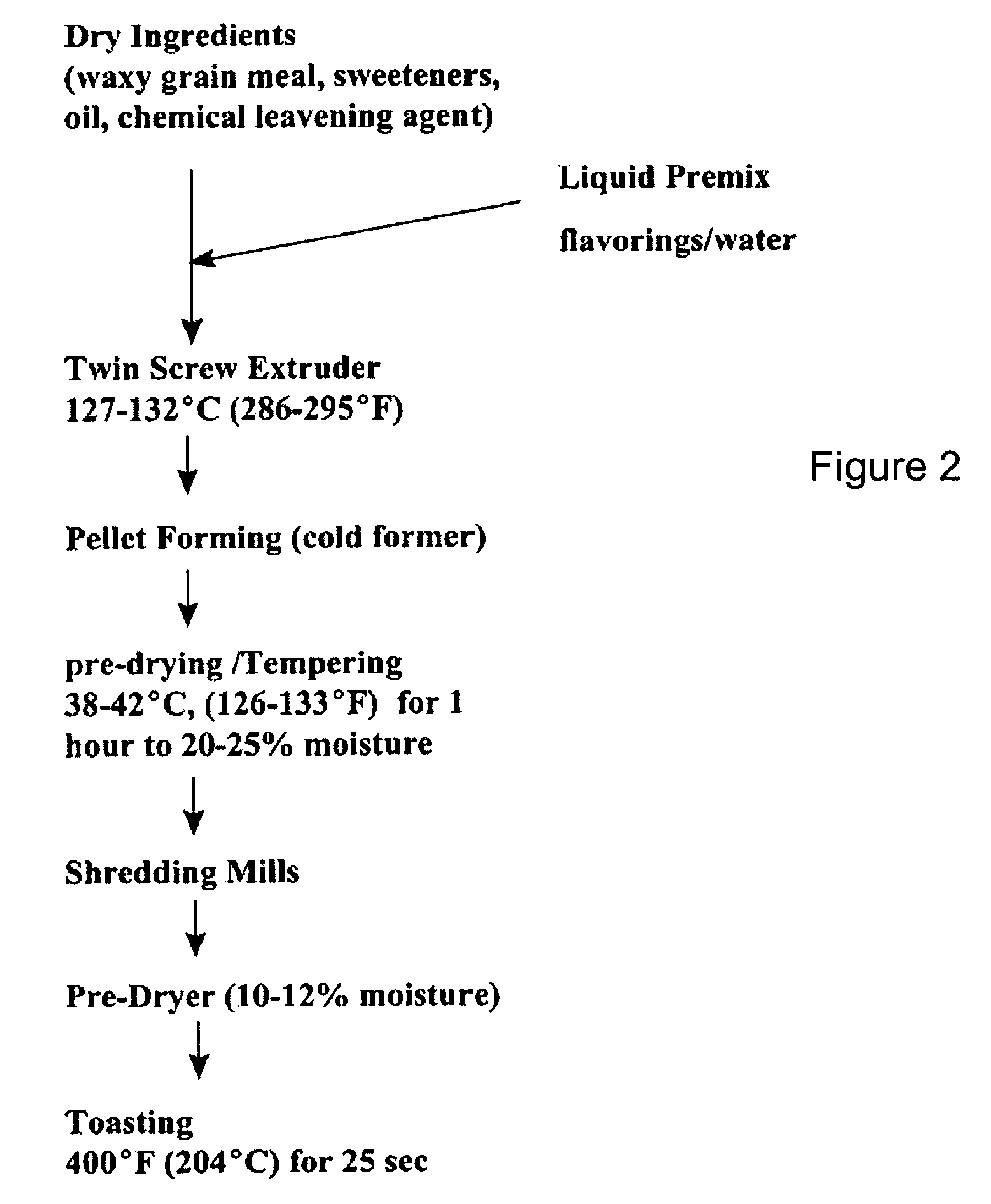Waxy wheat products and processes for producing same
a technology of waxy wheat and products, which is applied in the field of waxy wheat products and processes for producing same, can solve the problems of oxidative and enzymatic degradation of food products from processed grains, unpalatable raw grains, and generally unpalatable grains, etc., and achieves the effects of reducing the development of bacterial growth, and reducing the development of rancid odors and tastes
- Summary
- Abstract
- Description
- Claims
- Application Information
AI Technical Summary
Benefits of technology
Problems solved by technology
Method used
Image
Examples
example 1
[0051]In this example the products were prepared from waxy barley or from waxy wheat.
[0052]Waxy barley with less than 1% residual hull attached (or waxy wheat) was received cleaned and was steamed in a rotary cooker for 7-10 minutes at 17 psi and then tempered at 165° F. (74° C.) for 1 hour prior to bumping.
[0053]The tempered barley (or wheat) was lightly bumped through a roller mill, just enough to crack the pericarp of the grain. The bumped barley (or wheat) was then added back to the rotary cooker and steamed 10-15 minutes at 17 psi (260° F., 127° C.). The cooker was depressurized and a mixture of sugar, salt, high fructose maize syrup, was then added. The cooker was then pressurized to 17 psi for approximately 30 to 40 minutes to gelatinize the starch throughout the grain. The barley (or wheat) was then cooled and individual grains were separated. The moisture content was about 30-33%. The individual grains were then dried for 20 minutes at 200° F. (94° C.) to a moisture range o...
example 2
[0054]In this example products were prepared from waxy barley or from waxy wheat.
[0055]The grain (waxy barley or waxy wheat) was processed as described in Example 1 until the drying step wherein the individual gelatinized grains were dried to a moisture content of 20% to 18%. The individual grains were mixed with a soy flour to about 25% of the total weight, and the mix of grain and flour were added to a pasta press and blended with water, about 10% of the total weight. The resulting product was extruded as a pellet using a press. The pellets were then dried to 16% moisture and flaked through a roller mill. The flakes were then toasted in a fluidized bed of air using the same procedure and temperatures as set forth in Example 1. The moisture content of toasted product was about 2.5 to 3%.
example 3
[0056]In this example products were prepared from waxy barley or from waxy wheat.
[0057]
Waxy Grain20.00lbs.(Hulless Barley CDC Candleor Waxy Wheat)Sugar3.43lbs.Salt.37lbs.High fructose corn syrup.70lbs.Water3.74lbs.
[0058]Pre-Processing Procedure:
[0059]The waxy grain was washed and steeped in warm (120° F., 49° C.) water for 5 minutes and then put on a screen and drained. The grain was put in a large barrel and steamed using a live steam hose for 5 minutes. The steamed grain was left in a bucket to temper at 160° F.-200° F. (71° C.-93° C.) for 1 hour to increase the moisture content and loosen the pericarp. The grain was then bumped, similarly to an old fashion-rolled oat, through a small scale flaking mill. Fifty pounds of the bumped grain was produced.
[0060]Cooking Procedure:
[0061]A cooker was loaded with 20 pounds of the pre-processed grain. The grain was cooked for about 15 minutes by sealing the cooker and increasing the pressure at a rate sufficient to reach 16 psi in 9 minutes ...
PUM
 Login to View More
Login to View More Abstract
Description
Claims
Application Information
 Login to View More
Login to View More - R&D
- Intellectual Property
- Life Sciences
- Materials
- Tech Scout
- Unparalleled Data Quality
- Higher Quality Content
- 60% Fewer Hallucinations
Browse by: Latest US Patents, China's latest patents, Technical Efficacy Thesaurus, Application Domain, Technology Topic, Popular Technical Reports.
© 2025 PatSnap. All rights reserved.Legal|Privacy policy|Modern Slavery Act Transparency Statement|Sitemap|About US| Contact US: help@patsnap.com



